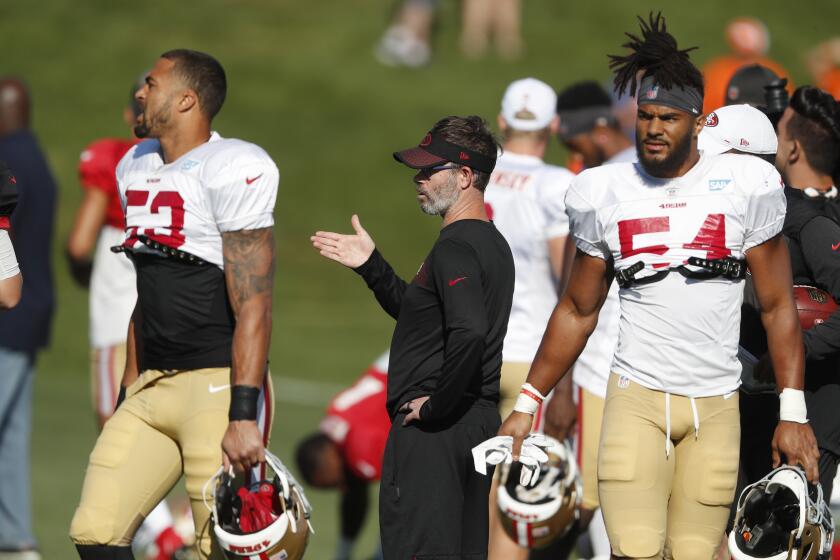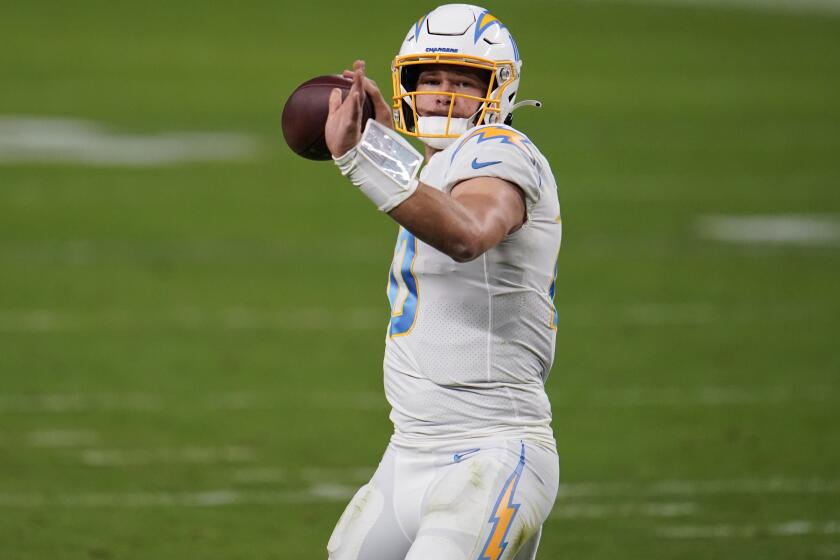Chargers and tight end Hunter Henry want to reunite, but will they have to tag him?

- Share via
The Chargers want to keep Hunter Henry, and the tight end is interested in remaining with the team that drafted him in 2016.
After those simple truths, the situation becomes a little more complicated entering Tuesday, when the NFL’s window to place a franchise tag on players opens.
Tagging Henry for a second consecutive year would secure his services for 2021, bringing back one of quarterback Justin Herbert’s favorite targets. The move would cost the team about $12.7 million, however, a significant hit during an offseason when the salary cap will go down.
The more flexible financial option would be to sign Henry to an extension, allowing the Chargers to lower his 2021 cap number. Of course, signing players to extensions is rarely easy.
The tight-end market swelled in August when San Francisco’s George Kittle ($15 million per year) and Kansas City’s Travis Kelce ($14.3 million) signed new contracts. Though Kittle and Kelce both have been All-Pro, Henry is considered to be among the league’s best tight ends who are next in line. He is a sure-handed receiver and a dependable blocker.
Henry, 26, is coming off a season in which he had a career-high 60 catches for 613 yards and four touchdowns. He was targeted 93 times — also a career best and second on the team to Pro Bowl wideout Keenan Allen.
Since quarterbacks coach Pep Hamilton has left the Chargers after a successful season with Justin Herbert, Shane Day has been given the task of developing the young signal-caller.
After a torn knee ligament cost Henry the 2018 regular season, he rebounded to appear in 26 of 32 games the past two seasons. The Chargers drafted Henry out of Arkansas in the second round, No. 35 overall.
Tight end is not a position of depth for the team. Ten-year veteran Virgil Green missed the final 10 games of last season because of an ankle injury, and will be a free agent. Backups Donald Parham and Stephen Anderson combined for 18 receptions in 2020.

The franchise tag paid Henry $10.6 million in 2020 and marked a notable development for the Chargers. The team has used the franchise tag only twice since 2011. Defensive end Melvin Ingram was tagged in 2017 before signing a four-year, $66-million extension.
Despite the salary cap decreasing, the Chargers are in decent financial shape. Although many teams will be left scrambling to meet the new budget demands, the Chargers have nearly $24 million in space, according to OverTheCap.com.
Chargers quarterback Justin Herbert, the NFL’s offensive rookie of the year, said he will seek tips from Drew Brees and other veteran quarterbacks.
The Chargers have made no moves to create more room. Along with restructuring deals, they could look to waive players.
The most obvious candidates to be cut include right guard Trai Turner, cornerback Casey Hayward and defensive tackle Linval Joseph.
Turner was hurt much of last season and started a career-low nine games. Hayward struggled at times while dealing with various injuries. Joseph had a solid season after signing as a free agent last offseason.
Releasing Turner would save $11.5 million against the cap; Hayward’s departure would save $9.75 million; and Joseph’s, $7.9 million.
More to Read
Go beyond the scoreboard
Get the latest on L.A.'s teams in the daily Sports Report newsletter.
You may occasionally receive promotional content from the Los Angeles Times.









